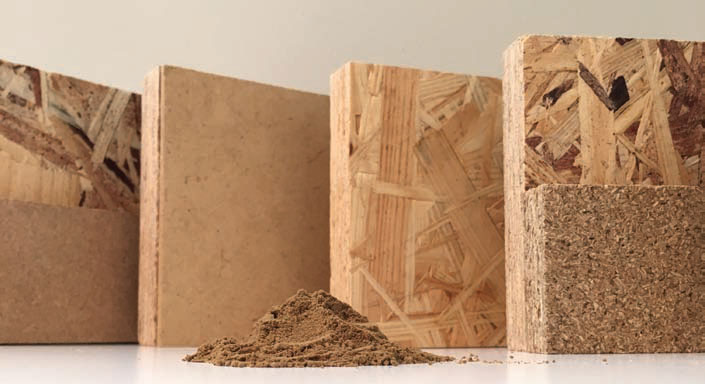Plants or petrol? New resins for old
15 March 2017Evertree is a new company specialising in replacing petroleumbased chemicals with those derived from vegetable proteins. Its first product is claimed to reduce – and eventually eliminate – formaldehyde-based resins in the panels industry. Industrial trials with three North American companies have proved positive. Julian Champkin talked to Fabrice Garrigue, CEO of Evertree
Evertree is a company that is entering a distinctive market. "It is very, very rare to enter a green chemical market with a clear economic argument," says the company, which claims to be doing just that as it brings its new product to the wood panels industry.
The product is a protein derived from rape seed meal, the mass that is left over after the oil has been squeezed from the seed. And Evertree's technology is transforming it into an additive to start with – a substitute is to come – which reduces resin use in wood based panels by up to 40%.
"Since over 50% of the cost of a board is resin, that makes a clear and substantive economic incentive," says Fabrice Garrigue, CEO of Evertree, the French company behind the product.
There is another advantage claimed: by reducing the volume of resin in boards, the additive is also designed to reduce the VOC emissions from them – in particular, the formaldehyde emissions.
Mr Garrigue, when not negotiating the hazards of Parisian traffic on his bike, is an apostle for replacing petroleum-based chemical technologies with plant-based ones.
"While the energy industry has been gradually weaning itself off oil, the chemical sector has been dragging its feet," he says.
His background is business rather than chemistry or wood: "I am a businessman, but I have been immersed in the chemical world for more than 20 years."
He has spent time with chemical companies Rhodia Chimie and Perstorp, but began his career with Rhône-Poulenc, the pharmaceutical, chemical and animal feeds giant, which merged to form Aventis in 1999.
"I was involved with isocyanates. That was my first experience in the chemical world – and it was a petroleum world. I joined Evertree because I had come to believe it was very, very important to develop plant-based chemistry. The Evertree project is born within chemistry and within agriculture."
Evertree itself is a coming-together of three main partners. One is the Avril group, which was set up in 1983 at the initiative of French farmers. Its purpose was to assure a future for vegetable oils and proteins and since its founding it has become a major industrial and financial group in sectors as diverse as human and animal feeds, renewable energies and renewable chemistry. The common thread is the creation of sustainable value in plantbased products – such as those derived from rape seed.
Financial backing for Evertree comes from, among others, Bpifrance, which, backed by the French government, provides credit, collateral and equity financing support for new companies from start-up through to stock exchange listing. Evertree has €24m to develop and market its first industrial application. The three partners have agreed to contribute a total of €72m to the company over four years. The third partner is an Israeli start-up, Biopolymer Technologies, founded in 2010, of which more in a moment.
"Aventis began more than two years ago to investigate what could be developed in terms of products from meal: that is, the residues of such things as rape seed and soya after the oils have been extracted," says Mr Garrigue. "That was the beginning of my adventure. Happily, I met with Biopolymer Technologies. Their competence is in technology for producing polymers from plant proteins as an alternative to fossil oil based products."
The core technology is identifying and isolating the polypeptide fractions and other key chemical components in agricultural meal produced by crushing oilseed, then to combine and derive from them to create a molecule with a function.
"In the US, Biopolymer had tested a product for the wood based panels industry based on canola meal. We decided to support their effort and strike a deal." The partnership came to fruition and Mr Garrigue became CEO of Evertree, founded last year; or as he puts it: "We decided it would be great to develop the rest of our adventure together."
So how did the interest in wood based panels come about? A happy accident of research, or something more directed?
"The lead scientists at Biopolymer Technologies are Dr Joseph Marcinko and Dr Tony Parker. They have spent much of their R&D experience in isocyanates, and Dr Marcinko has been involved in wood composites for many years. That background, and their interest in polymers, made them very eager to develop a product to benefit the wood based industry using plants, not petroleum," says Mr Garrigue.
"They knew they could extract raw materials to make polymers which would support the reduction in use of formaldehyde based resin. That was their vision – so it was no accident that the product has appeared.
It was linked to their understanding of what could be extracted from meal and their vision of what the world needed."
Technically, oilseed meal fractions from canola and rape seed have a unique composition that can be used to create aqueous dispersions capable of dispersing hydrophobic materials and reactive polymer resins. Their physical and organic chemistries allow the creation, formulation and stabilisation of various reactive molecules and chemical cross-linking materials – in this case adhesives for wood composites.
Rather than following a traditional industrial framework involving multiple steps of chemical processing to design a final product, Drs Marcinko and Parker try to mimic nature as much as possible, since it has already given the material a structure they can use.
"Our underlying innovation focuses on applications that can use this natural design and therefore minimise industrial chemical processing," they say.
And both the originating researchers are passionate about their science being put to use. "I like science to be applicable" is a quote from Dr Marcinko. "Nothing thrills me more than seeing an idea in the lab solve a realworld problem faced by a customer."
Mr Garrigue contiues: "All that's been done was closely related to the experiments.
"Everyone involved is very keen to get to the market. With North American customers we have run trials supporting fundamental research. Biopolymer Technology was involved in trials with more than three big players, each with more than 5% of the wood based panel market in the US, in segments such as MDF and OSB.
"Together they represent between 10 and 20% of the market. The trials were not just at pilot level but at manufacturing units running for several hours. The properties of the boards produced are good.
"So we have proof of concept and more: we have fact-based results generated at industrial level. The challenge now is to find industrial funding to move from the boutique level to the big industrial level.
"We are not yet at full-scale production," adds the CEO. "Since the creation of Evertree we have moved beyond the very promising results necessary to increase the initial scale and repeatability on a regular basis.
We have shown repeatability with other combinations of resins and boards, and flexibility for all the different board and resin types. We have shown that it works for different densities and species of wood, all using different recipes, and for thicknesses ranging from 3mm to 19mm. Our product is not recipe-specific, but usable over a wide range of recipes. Proving that robustness and flexibility is an area where we have spent a lot of our resources," continues the CEO.
"And we have been developing our own resource base. We have set up an application lab in the US, near Philadelphia, to support our customers there, and we have our own global R & D centre at Compiègne, just north of Paris, where we have space for offices, research and lab work. It is 50% operational.
"We are also setting up machinery to produce our own boards there at a scale that will be representative for industry. We will have it available to support the qualitative process for each of our customers," he says.
"We have of course initiated customer tours. As of today, in North America and Europe, we have been in contact with 70% of the market in MDF, particleboard and OSB.
All these players have expressed their very strong interest in our proposition, and in launching trials at their own sites.
"Obviously, that strong interest is a guarantee for us that what we are doing is commercially realistic and means that we can launch at real industrial scale." A dedicated production facility is due to open in 2018.
"We plan initially to be manufacturing around 10,000 tonnes of product annually," says Mr Garrigue. By 2020 this is envisaged to rise to 50,000 tonnes a year, selling at a price that Bloomberg suggests will be somewhere between two and seven euros per kg. 110 jobs will be directly created.
The beauty of the technology, he says, is that it exploits not only the physical strength of the additive but also its chemistry to make better use of the resin. "So you can make the same board, with the same properties, but using less resin. A saving of 40% in resin is very substantial, and that is the sort of figure that is attainable. It supports replacement of Formaldehyde-based resins. And it can also generate additional savings in wax and in wetting agents, reducing or removing the need for them," says Mr Garrigue.
"So there are a lot of benefits from our technology. It is not just about VOC reduction, important though that is; it is also about savings in total costs – improvements in productivity without dramatically changing the manufacturing process.
"Beyond the physical chemistry we know that from our unique raw material we can produce some adhesion. So in the medium and the long term we will be working with the market to achieve 100% replacement of phenolics with plant-based resins. We have made good progress with that recently.
"Beyond the first version of our product we know that we can make boards without any traditional resin content at all. That will be a reality within the next five years. It has emerged from certain recent discoveries we have made at research level."We allow Mr Garrigue for a moment to wax lyrical: "We have planted a seed of science that we are watering and fertilising with technologies and industrial capabilities. It will develop into an ever-growing tree of new products derived from oil seed that will revolutionise the world of chemicals.
"We have our lab in Philadelphia and our R&D facilities in Compiegne; we have trialled manufacturing operations in US and Europe; some basic engineering is in place. Our assets will be ready for full-scale production by 2018 – which doesn't mean we cannot supply customers before that.
"Today we have our first product launch which reduces resins, wax and wetting agents. That is already a very good business proposition. Combine that with where we will be in a few years time, when we will be able to offer a 100% plant-based resin.
"Those are two different business propositions. The first will show that we can do the step-change. We will be able to use that demonstrated experience to support the second stage. And that will be the real Big Bang!"

